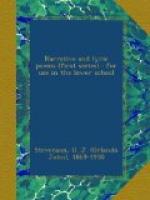[1] Written in 1802 or 1803, when an invasion of England by Napoleon was expected.
[2] This phrase is quoted from a poem by Daniel, an Elizabethan poet.
[3] in bogs and sands should perish. Should be destroyed by Napoleon.
THE COURTSHIP OF MILES STANDISH.[1]
I
MILES STANDISH.
In the Old Colony days, in Plymouth the
land of the Pilgrims,[2]
To and fro in a room of his simple and
primitive dwelling,
Clad in doublet[3] and hose, and boots
of Cordovan[4] leather,
Strode, with a martial air, Miles Standish
the Puritan Captain.
Buried in thought he seemed, with his
hands behind him,
and pausing
5
Ever and anon to behold his glittering
weapons of warfare.
Hanging in shining array along the walls
of the chamber,—
Cutlass and corselet[5] of steel, and
his trusty sword of Damascus,[6]
Curved at the point and inscribed with
its mystical[7] Arabic sentence,
While underneath, in a corner, were fowling-piece,
musket,
and matchlock.[8]
10
Short of stature he was, but strongly
built and athletic,
Broad in the shoulders, deep-chested,
with muscles and sinews of iron;
Brown as a nut was his face, but his russet
beard was already,
Flaked with patches of snow, as hedges
sometimes in November.
Near him was seated John Alden,[9] his
friend and household
companion,
15
Writing with diligent speed at a table
of pine by the window;
Fair-haired, azure-eyed, with delicate
Saxon complexion,
Having the dew of his youth, and the beauty
thereof, as the captives
Whom Saint Gregory saw, and exclaimed,
“Not Angles but Angels."[10]
Youngest of all was he of the men who
came in the Mayflower. 20
Suddenly breaking the silence, the diligent
scribe interrupting,
Spake, in the pride of his heart, Miles
Standish the Captain
of Plymouth.
“Look at these arms,” he said,
“the warlike weapons that hang here
Burnished and bright and clean, as if
for parade or inspection!
This is the sword of Damascus, I fought
with in Flanders;[11]
this breastplate,
25
Well I remember the day! once saved my
life in a skirmish;
Here in front you can see the very dint
of the bullet
Fired point-blank at my heart by a Spanish
arcabucero.[12]
Had it not been of sheer steel, the forgotten
bones of Miles Standish
Would at this moment be mould, in their
grave in the
Flemish morasses.”
30
Thereupon answered John Alden, but looked
not up from his writing:
“Truly the breath of the Lord hath
slackened the speed of the bullet;




